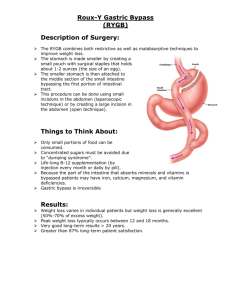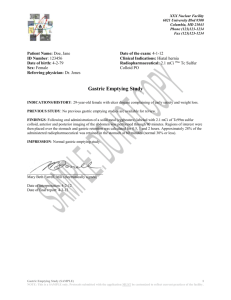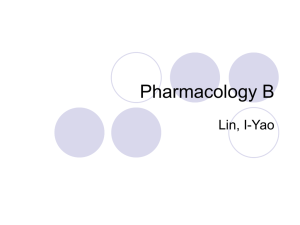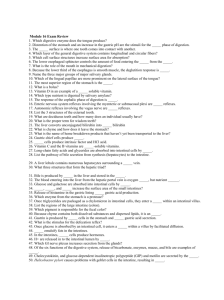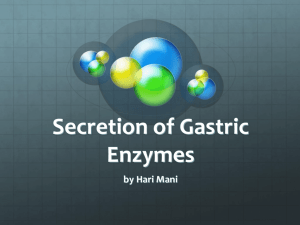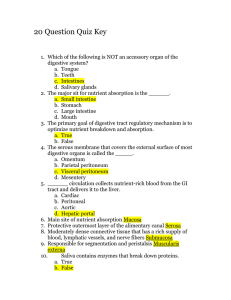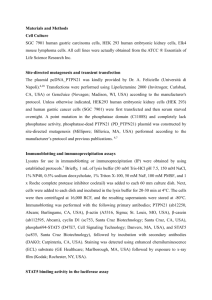5 The Gastrointestinal System and Aging Questions and Answers
advertisement
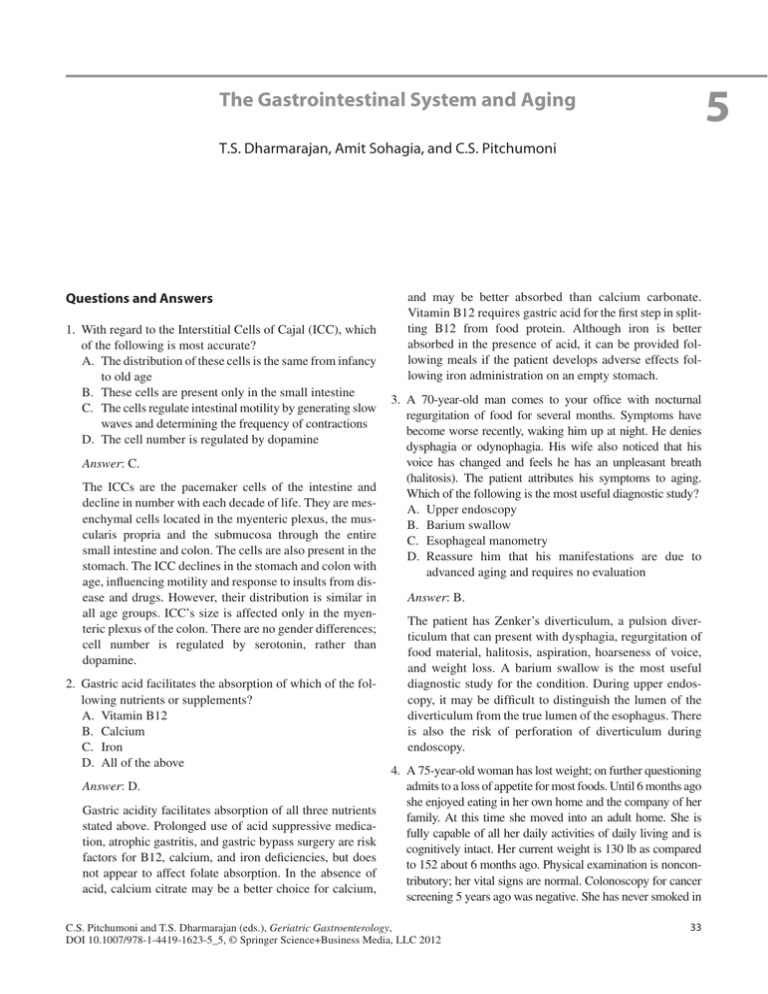
5 The Gastrointestinal System and Aging T.S. Dharmarajan, Amit Sohagia, and C.S. Pitchumoni Questions and Answers 1. With regard to the Interstitial Cells of Cajal (ICC), which of the following is most accurate? A.The distribution of these cells is the same from infancy to old age B. These cells are present only in the small intestine C.The cells regulate intestinal motility by generating slow waves and determining the frequency of contractions D. The cell number is regulated by dopamine Answer: C. The ICCs are the pacemaker cells of the intestine and decline in number with each decade of life. They are mesenchymal cells located in the myenteric plexus, the muscularis propria and the submucosa through the entire small intestine and colon. The cells are also present in the stomach. The ICC declines in the stomach and colon with age, influencing motility and response to insults from disease and drugs. However, their distribution is similar in all age groups. ICC’s size is affected only in the myenteric plexus of the colon. There are no gender differences; cell number is regulated by serotonin, rather than dopamine. 2. Gastric acid facilitates the absorption of which of the following nutrients or supplements? A. Vitamin B12 B. Calcium C. Iron D. All of the above Answer: D. Gastric acidity facilitates absorption of all three nutrients stated above. Prolonged use of acid suppressive medication, atrophic gastritis, and gastric bypass surgery are risk factors for B12, calcium, and iron deficiencies, but does not appear to affect folate absorption. In the absence of acid, calcium citrate may be a better choice for calcium, and may be better absorbed than calcium carbonate. Vitamin B12 requires gastric acid for the first step in splitting B12 from food protein. Although iron is better absorbed in the presence of acid, it can be provided following meals if the patient develops adverse effects following iron administration on an empty stomach. 3. A 70-year-old man comes to your office with nocturnal regurgitation of food for several months. Symptoms have become worse recently, waking him up at night. He denies dysphagia or odynophagia. His wife also noticed that his voice has changed and feels he has an unpleasant breath (halitosis). The patient attributes his symptoms to aging. Which of the following is the most useful diagnostic study? A. Upper endoscopy B. Barium swallow C. Esophageal manometry D.Reassure him that his manifestations are due to advanced aging and requires no evaluation Answer: B. The patient has Zenker’s diverticulum, a pulsion diverticulum that can present with dysphagia, regurgitation of food material, halitosis, aspiration, hoarseness of voice, and weight loss. A barium swallow is the most useful diagnostic study for the condition. During upper endoscopy, it may be difficult to distinguish the lumen of the diverticulum from the true lumen of the esophagus. There is also the risk of perforation of diverticulum during endoscopy. 4. A 75-year-old woman has lost weight; on further questioning admits to a loss of appetite for most foods. Until 6 months ago she enjoyed eating in her own home and the company of her family. At this time she moved into an adult home. She is fully capable of all her daily activities of daily living and is cognitively intact. Her current weight is 130 lb as compared to 152 about 6 months ago. Physical examination is noncontributory; her vital signs are normal. Colonoscopy for cancer screening 5 years ago was negative. She has never smoked in C.S. Pitchumoni and T.S. Dharmarajan (eds.), Geriatric Gastroenterology, DOI 10.1007/978-1-4419-1623-5_5, © Springer Science+Business Media, LLC 2012 33 34 T.S. Dharmarajan et al. her life. Medications include calcium, vitamin D, and aspirin. Routine blood tests are pending. The most likely cause is: A. Age-related loss of appetite B. Age-related gastroparesis loss of smell and appetite C. Depression D. Gastrointestinal cancer Answer: C. Age-associated taste disturbances or olfactory loss are never profound with a weight loss of over 20 lb (over 10%) in 6 months. These physiological changes are gradual and subtle, and hardly affect quality of life. Olfaction is most consistently lost with age, while taste discrimination rather than universal loss of appetite more likely to be the manifestation. A weight loss of over 10% in 6 months requires evaluation. In this case a change in appetite in a patient who enjoys life following change of environment suggests an unhappy patient who is likely depressed. While depression can be screened for, it is unlikely to be proved by specific tests. A trial of antidepressants is called for. Testing for other causes of weight loss such as gastric cancer, hyperthyroidism, or an infectious disease is indicated only when initial routine tests in conjunction with the exclusion of depression have been addressed. In this nonsmoker, colonoscopy was negative, further supporting the plans stated. 5. True statements with regard to pancreatic polypeptide include all of the following except: A. Stimulates cholecystokinin (CCK) and secretin B. Inhibits pancreatic exocrine secretion C. Inhibits gallbladder contractility D. Inhibition of intestinal motility Answer: A. The physiological effects of PP are not clear, but presumed to be inhibitory of pancreatic exocrine secretion. Other roles are inhibitory effects on gallbladder contraction, intestinal motility, and hepatic glucose production. Hospitalized patients may have reduced appetite through excessive release of PP. PP influences several physiological functions including gall bladder contraction and secretion, pancreatic exocrine secretion, intestinal motility, and ileal contractions. 6. A true statement with regard to glucagon-like peptide (GLP)-1 is: A. Increase in type 2 diabetes mellitus B. Opposes the incretin effect on oral glucose intake C. Stimulates gastric acid secretion D. Promotes incretin effect Answer: D. GLP-1 is produced by the L cells of the small intestine. GLP levels are decreased in type 2 diabetes. The hormone exerts its main effect by stimulating glucose-dependent insulin release from the pancreas. The incretin effect denotes a greater release of insulin compared to isoglycemic glucose infusion parenterally. 7. The gastric hormone, ghrelin is noted to: A. Cause appetite suppression B. Increase gastric acid C. Levels are increased during fasting D. Causes weight reduction Answer: C. Ghrelin is the natural ligand growth hormone secretogogue (GHS) receptor; it increases food intake and weight gain. Circulating ghrelin level increases during fasting and under conditions associated with negative energy balance, such as starvation or anorexia. In contrast, levels are low following feeds and in obesity. Ghrelin is a central neurohormonal regulator of food intake and energy homeostasis and serves as a signal for initiation of feeding. The usual premeal increase in levels is not observed in gastric bypass patients and may be one of the reasons for the effectiveness of gastric bypass surgery in inducing weight loss. Ghrelin levels may decline with aging and partially explain somatotropin regulation and anorexia in the older adult. 8. Which one of the following statements is true regarding the function of vagus nerve? A. Mediates receptive relaxation of gastric antrum B.Stimulates acid secretion by direct effect on muscarinic receptors on parietal, enterochromaffin cells C. Inhibits gastrin and somatostatin release D. Vagotomy enhances normal gastric emptying Answer: B. As food enters the proximal stomach, receptive relaxation occurs through vagally mediated inhibition of fundic tone. After the initial storage period of food in the proximal stomach (approximately 30 min), solids move on to the antrum. Segmental contractions originate in the midbody of the greater curvature of the stomach. This process is also under the influence of the vagus. Further the nerve is also responsible for stimulation of gastrin release and inhibition of somatostatin. Vagal nerve dysfunction (or injury or vagotomy) leads to failure of receptive relaxation, causing early satiety. In addition there is a failure of antral grinding. The result is a delay in emptying of gastric contents. Patients who undergo vagotomy or damage the nerve will have delay in gastric emptying.
